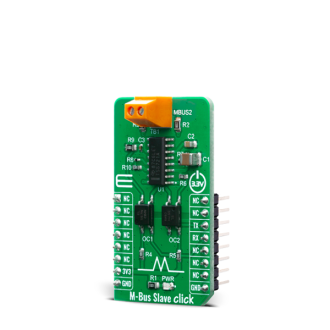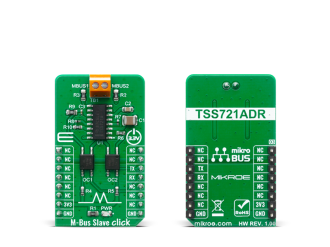
We strongly encourage users to use Package manager for sharing their code on Libstock website, because it boosts your efficiency and leaves the end user with no room for error. [more info]

Rating:
Author: MIKROE
Last Updated: 2020-06-30
Package Version: 1.0.0.0
mikroSDK Library: 1.0.0.0
Category: RS232
Downloaded: 3792 times
Not followed.
License: MIT license
M-Bus Slave Click is a Click boardâ„¢ equipped with the TSS721A, a single chip transceiver developed for Meter-Bus applications according to EN1434-3 standard, developed by Texas Instruments. The connection to the bus is polarity independent and serves as a slave node in the system.
Do you want to subscribe in order to receive notifications regarding "M-Bus Slave click" changes.
Do you want to unsubscribe in order to stop receiving notifications regarding "M-Bus Slave click" changes.
Do you want to report abuse regarding "M-Bus Slave click".


Library Description
The library covers all the necessary functions to control M-BUS click board. Library performs a standard UART interface communication.
Key functions:
void mbus_write_byte ( uint8_t input ) - Write Single Byte.uint8_t mbus_read_byte( void ) - Read Single Byte.uint8_t mbus_byte_ready ( void ) - Check for new byte received.Examples description
The application is composed of three sections :
void application_task ( )
{
char tmp;
uint8_t drdy_flag;
if ( app_mode == APP_MODE_RECEIVER )
{
// RECEIVER - UART polling
drdy_flag = mbus_byte_ready( );
if ( 1 == drdy_flag )
{
tmp = mbus_read_byte( );
mikrobus_logWrite( &tmp, _LOG_BYTE );
}
}
else
{
// TRANSMITER - TX each 2 sec
for ( tmp = 0; tmp < 9; tmp++ )
{
mbus_write_byte( demo_message_data[ tmp ] );
mikrobus_logWrite( " >> MESSAGE SENT <<", _LOG_LINE );
Delay_ms( 100 );
}
Delay_ms( 2000 );
}
}
Other mikroE Libraries used in the example:
Additional notes and informations
Depending on the development board you are using, you may need USB UART click, USB UART 2 click or RS232 click to connect to your PC, for development systems with no UART to USB interface available on the board. The terminal available in all MikroElektronika compilers, or any other terminal application of your choice, can be used to read the message.